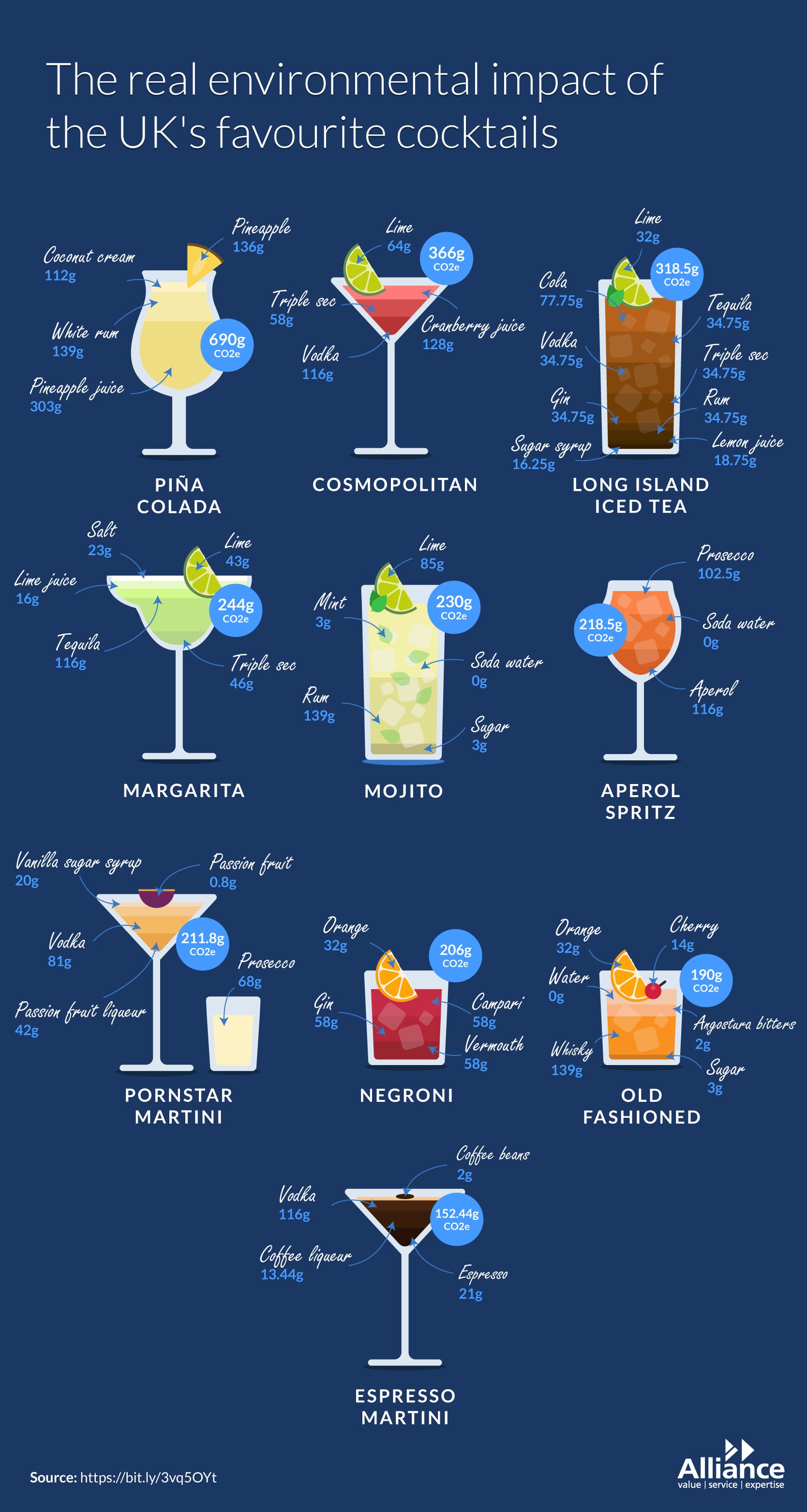Data from the wholesale catering equipment company, which was based on the top 10 cocktails according to Ahrefs, showed the cocktails with the least ingredients had the smallest carbon footprint.
Alliance Online marketing and online manager Rachael Kiss said: “It's incredibly important for us to reduce our carbon emissions, now more than ever, and the first step to reducing our carbon footprint is by recognising our impact and what we need to change.
“Cocktails can be big sellers for bars and restaurants, but the carbon footprint of just one drink is disturbing, and when you consider just how many cocktails are sold in any given day, it's clear we need to take steps to be more sustainable.”
The carbon footprint of the UK's top 10 cocktails
1. Piña colada — 690g of CO2e per drink
2. Cosmopolitan — 366g of CO2e per drink
3. Long Island iced tea — 318.5g of CO2e per drink
4. Margarita — 244g of CO2e per drink
5. Mojito — 230g of CO2e per drink
6. Aperol spritz — 218.5g of CO2e per drink
7. Pornstar martini — 211.8g of CO2e per drink
8. Negroni — 206g of CO2e per drink
9. Old fashioned — 190g of CO2e per drink
10. Espresso martini — 152.44g of CO2e per drink
According to Alliance online, importation of fruits was the biggest contributor to cocktails carbon footprints, with Piña Colada, which uses imported pineapples and coconut milk, found to produce 690g of CO2e (CO2 Emissions) per drink.
Small changes make a big difference
This equated to enough carbon emissions to drive 8.6 miles in a petrol-powered car or charge 420 smart phones for every five Piña Colada’s made.
Furthermore, a cosmopolitan worked out at 366g of CO2e per drink, due to the importation of the cranberries from America.
Comparatively the most eco-friendly, vodka-based Espresso Martini, produced just 152.44g of CO2e per drink.

However, there are a multitude of small changes operators can implement to make a big difference, according to Alliance Online.
For example, buying spirits form British distillers as well as locally grown seasonal fruit and finding alternatives for things like garnishes can all help cut emissions.
Cocktail chain Revolution was one of the larger operators to implement changes like this as the company recently swapped passion fruit garnishes for rice paper in a bid to become a NetZero business by 2030.
Important for the world
Kiss added: “All these small steps can have a big impact and they won't just benefit the environment either, you may find that you save a bit of money by using up leftovers.
“Your brand image might get a boost too, as more customers are choosing to shop with eco-friendly brands than ever before."
One venue dedicated to sustainability is GungHo! Cocktail bar in Brighton, East Sussex, which is number 33 on the Top 50 Cocktail Bars list, where licensee Julian Barnett and the team re-use and shop locally as much as possible.
Gungho! use everything from espresso coffee grounds to create a coffee liquor, to mint storks to make an oleo saccharum, as well as creating an egg white substitute to produce the froth on drinks such as Whisky Sours and compostable straws made of wheat.
Furthermore, the bar teamed up with a local apple orchard and, instead of importing lemons and limes, now use apple juice from the orchard infused with essential oils to replicate citric tastes.
Barnett said: “[Sustainability] is very important for the world right now, we always see news about the sea covered in plastic, it's horrible to see. If everyone does a little bit, then it really helps in a long way, it really has a massive impact.”





